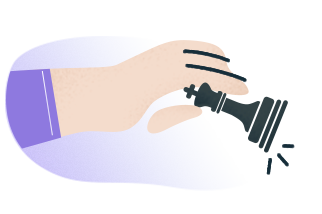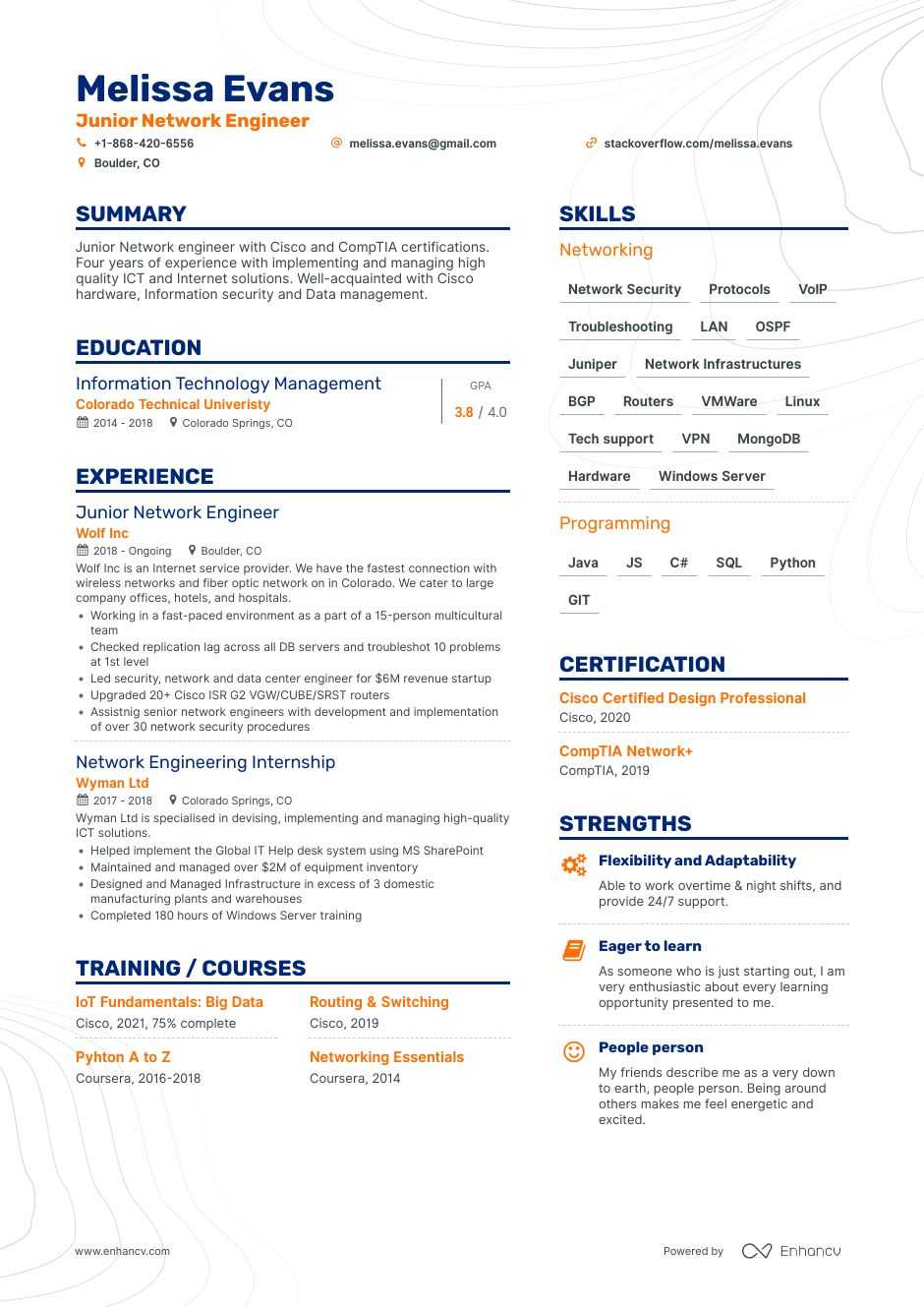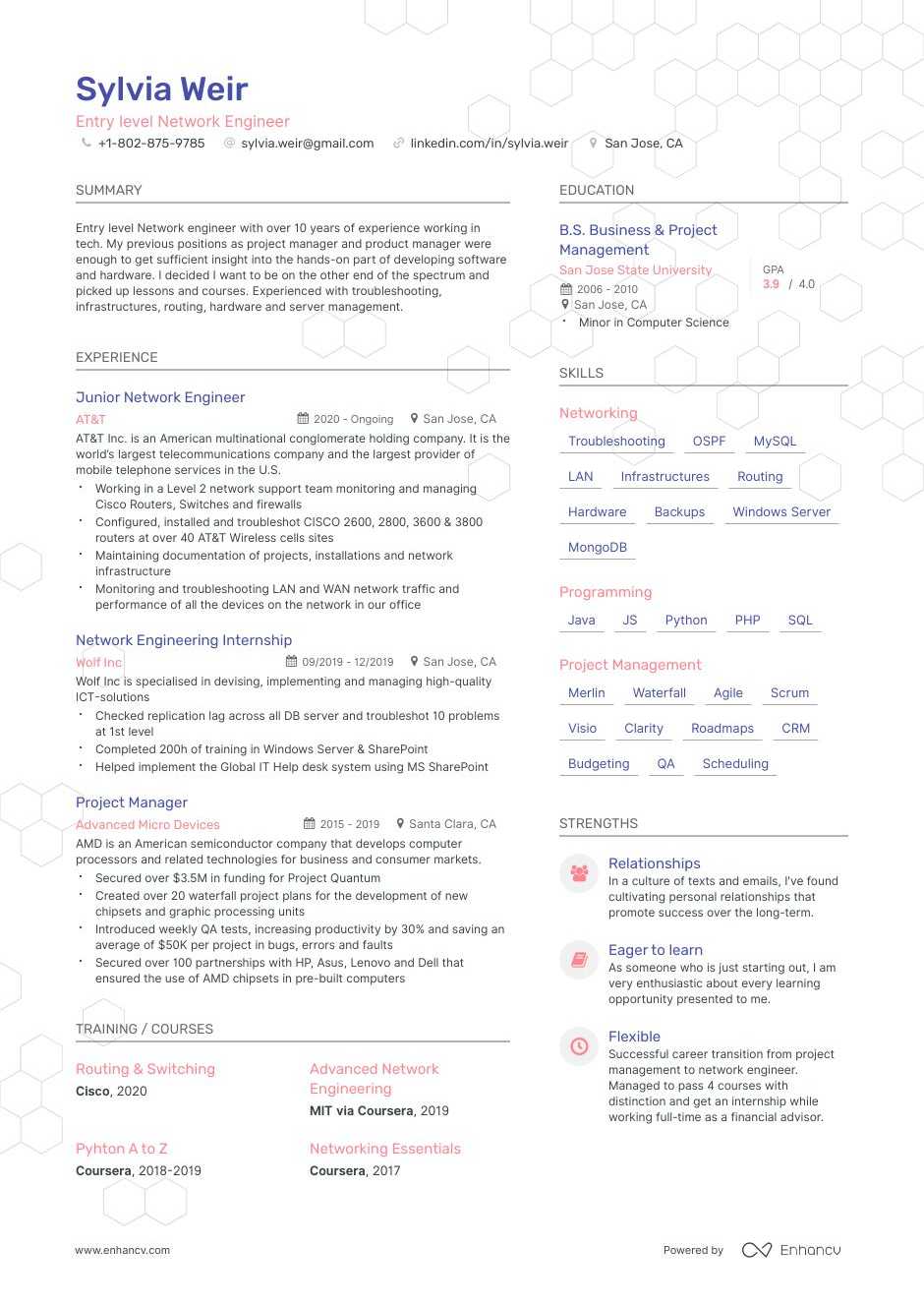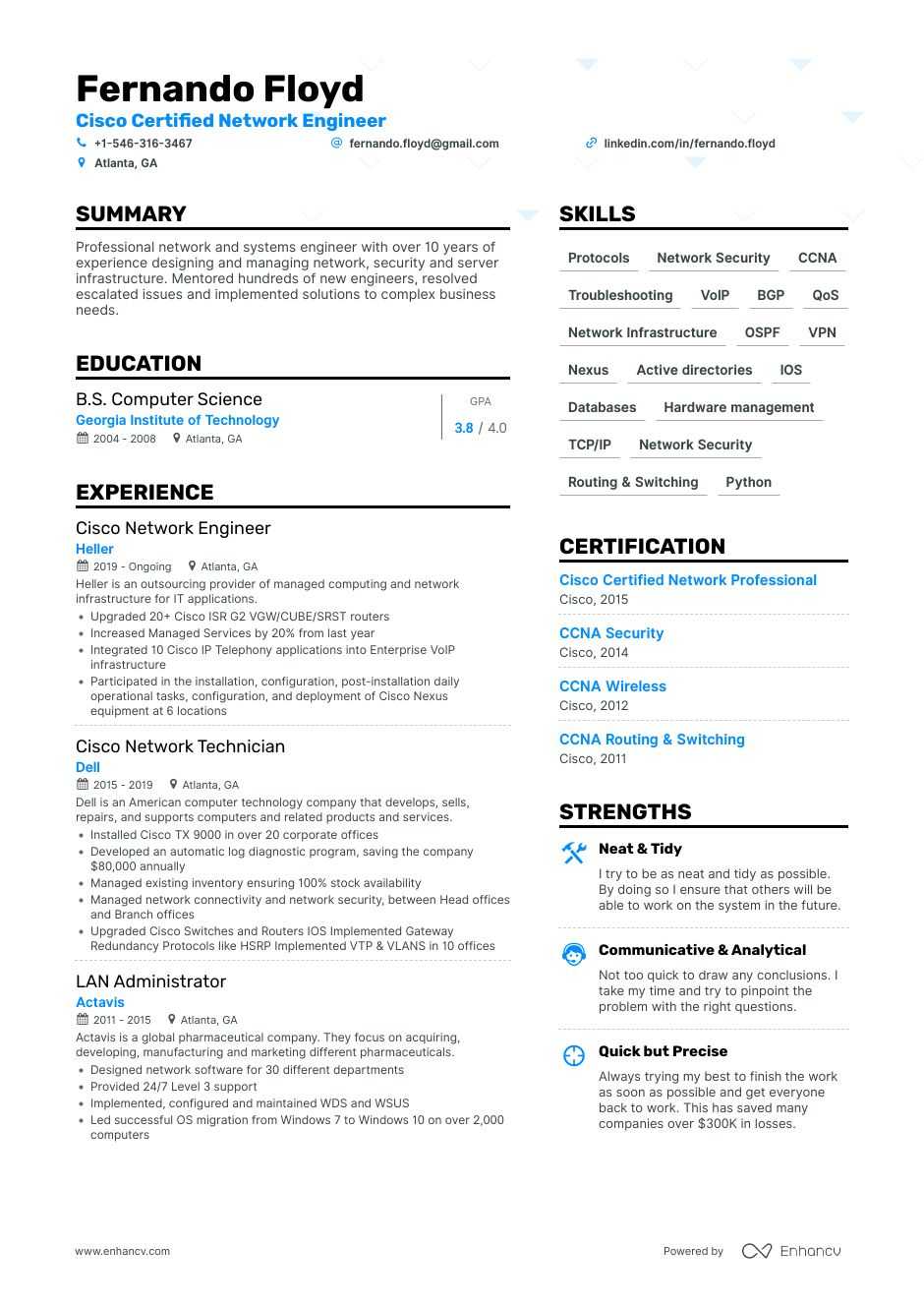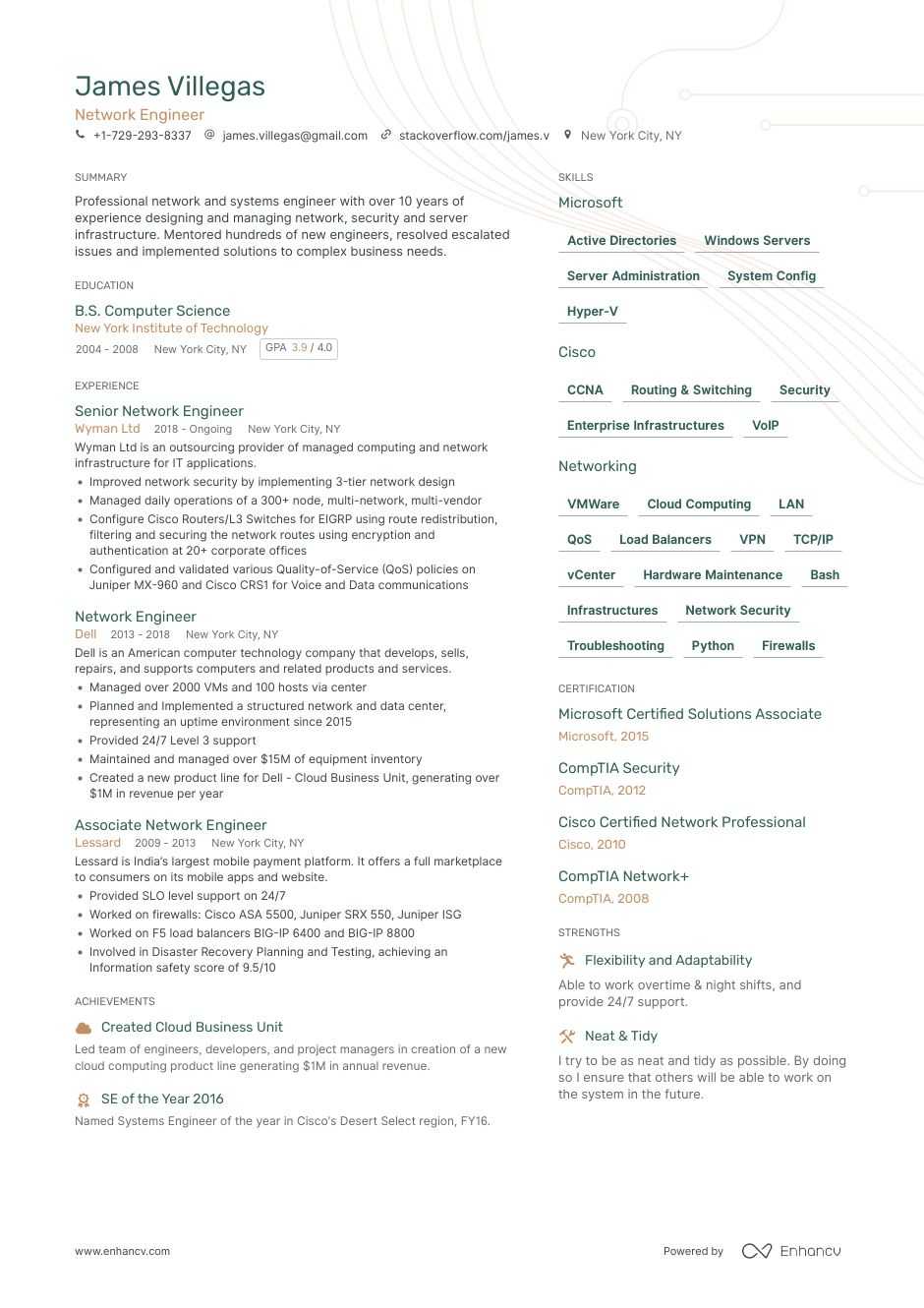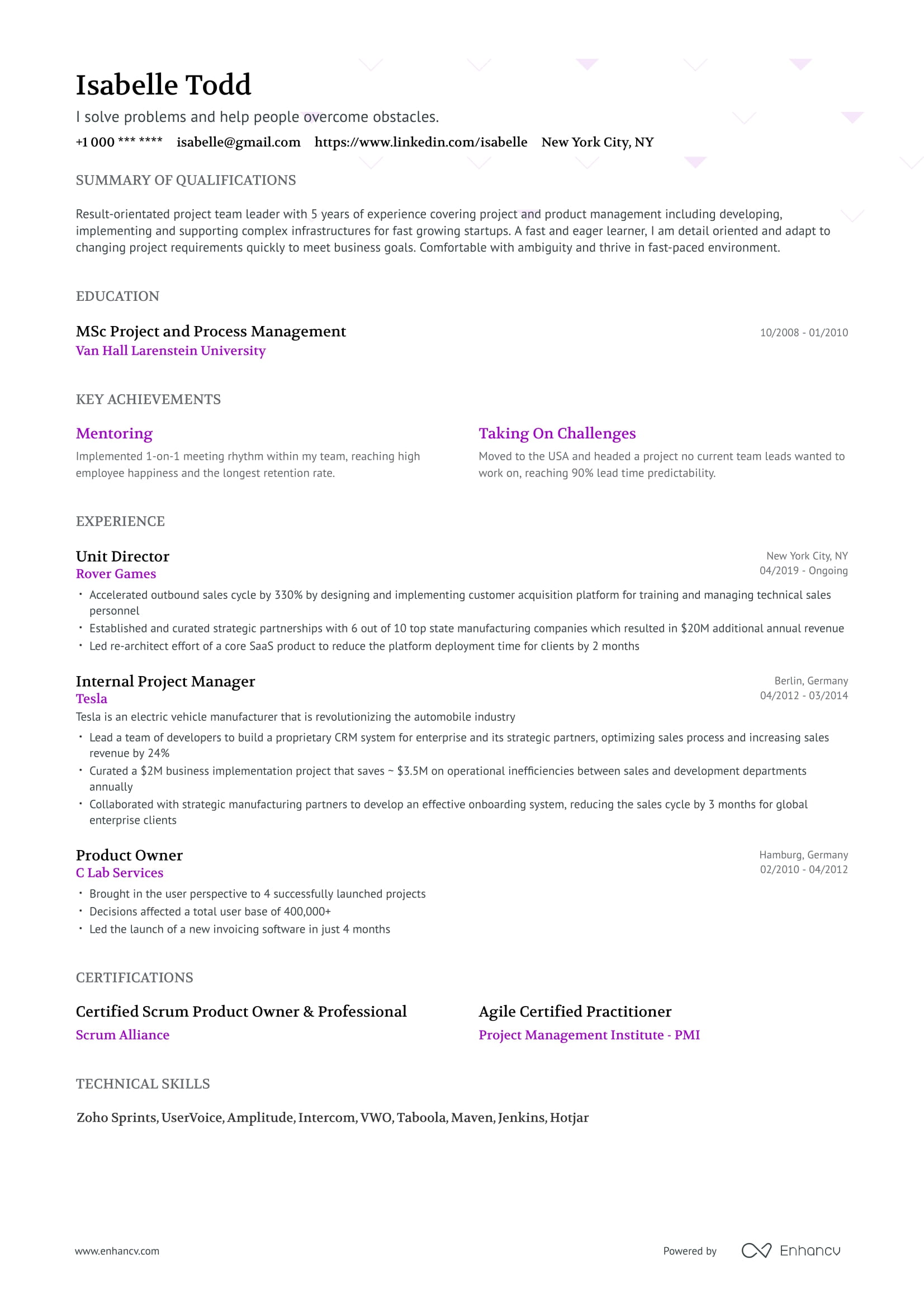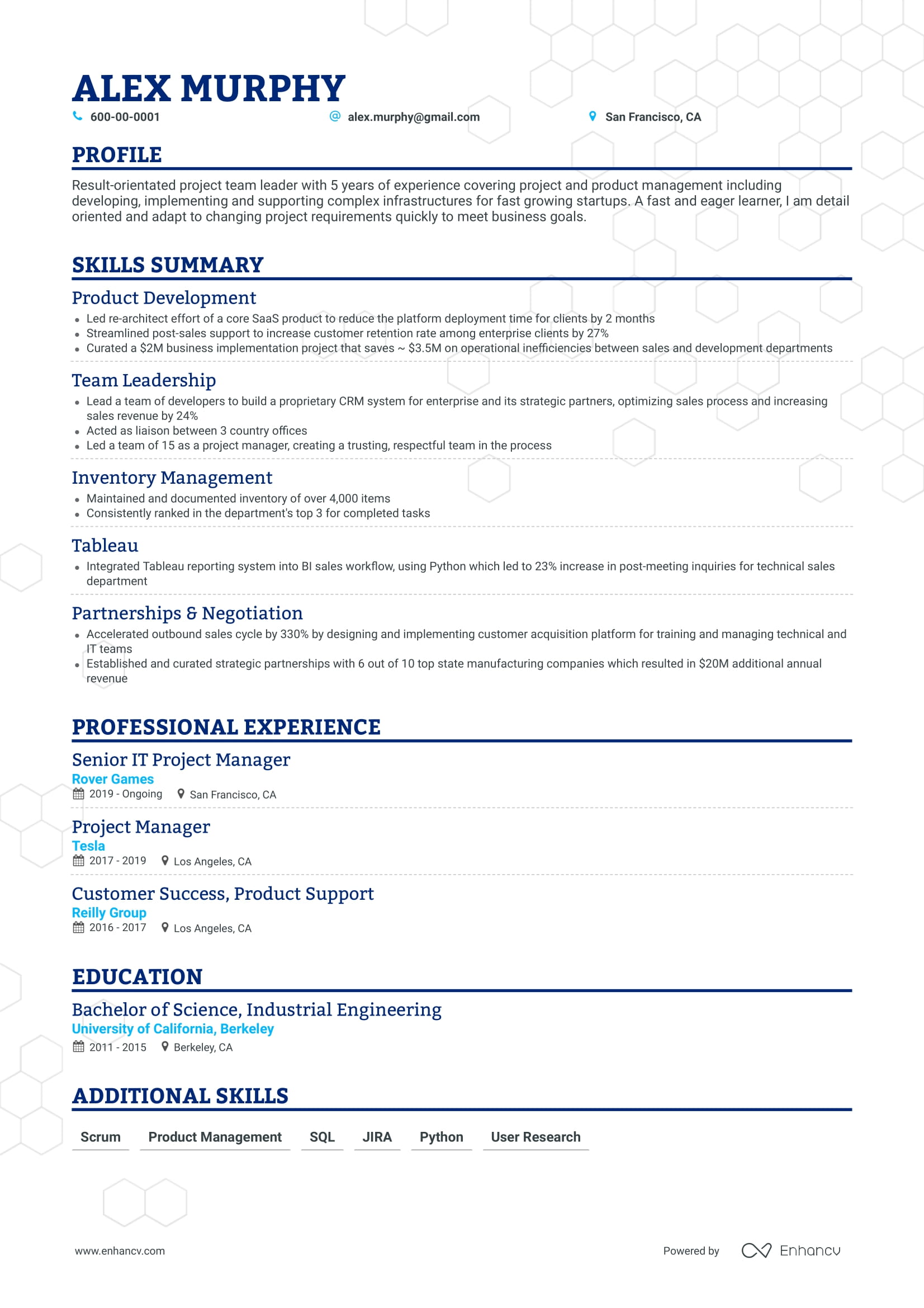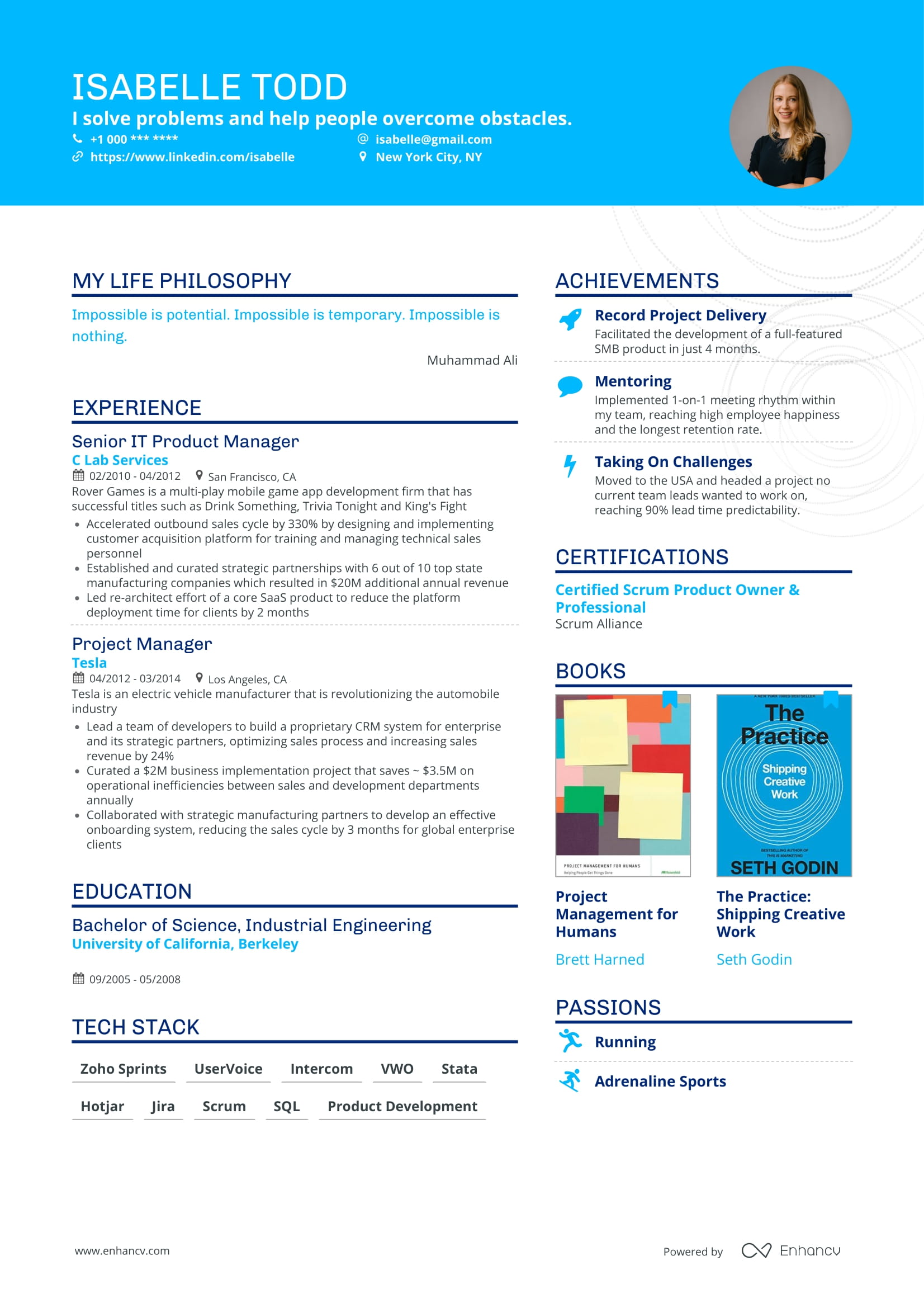Example Network Engineer Resume - Browse more resume templates and build a stand-out resume
Let’s write a good network engineer resume.
Correction, let’s write a great network engineering resume!
But, let’s start with why having a great resume is important for you?
Isn’t years of hard work, dedication and the Sr. network engineer role enough for you to land the job?
Sadly, no!
Tech hiring is highly driven by recruiters these days. Often the person who’s going to interview you is different from the one looking at your resume.
And, recruiters rely on very different parameters to filter applicants. It is remarkable how they’ve developed a sense of identifying bad candidates just by looking at their resume.
From keywords to a volume driven filtering - landing an interview has now become more about selling to the salesman.
We wrote this guide to show you exactly how you can:
- Write resumes that defies all odds when it comes to a volume based filtering
- Make sure your resume shows up more on the search engines of job boards and ATS
- Deliver an impact where 99% of the other candidates fail
- Turn a hiring manager into your hiring advocate
First, take some inspiration from these network engineer resume examples. At the end, your resume may look like these too!
Network Engineer resume examples
3 Network Engineer resume examples
Junior Network Engineer resume
Entry level Network Engineer resume
Cisco Network Engineer resume
But, you still have a blank paper ahead of you, how do you go from a blank paper to a cutting edge resume?
That’s what we are going to cover in the next section.
How to write a network engineer resume?
There are so many unspoken rules to write a network engineer resume.
Funny thing is, they change every year.
That’s why we always keep our resume examples updated with the help of subject matter experts.
Here’s what you absolutely must have in your 2019 network engineering resume.
Must have sections in your network engineer resume
- Resume header
- Resume skills
- Employment history/experience
- Certifications
You probably observed the same sections gaining exceptionally high visibility in the network engineering resume examples you saw before. That’s because, these sections are what actually leave an impact.
To bring you valuable insight from within the process, we sat down with one of the top recruiters in the space to get through her recruitment process and see how she went through shortlisting a Sr. network engineer resume.
For the sake of anonymity, let’s call her Jane.
She assessed over 30 applications right in front of us and we were not surprised to see how quickly she made her decisions while rejecting the ones that got rejected.
She basically scanned the resume first and then dove further into the sections. At the end of her resume assessment, she came up with the following parameters on those that did not see downright rejection:
- Header: Right
- Summary - 4/10
- Skills - 8/10
- Employment history - 6/10
- Certificates - 10/10
This resume had 4 other sections like education, books I read, volunteering, etc. Notice how they failed to contribute to the final assessment.
We contacted more recruiters and studied their application shortlisting process.
Here’s what we saw (something we see across most job application review process) - A badly written important section in a resume resulted into a hard rejection.
As we move forward, we will show you step by step on how to not only make Jane shortlist your resume, but how you can convince any recruiter on Earth that you’re the best candidate for network engineering role.
First, get your resume layout right.
A good resume layout isn’t about creativity. Rather, it is more about making someone’s job easier by making your resume skim friendly.
And you can select from any of these professional resume layouts:
- Functional layout - Emphasizes skills, lacks storytelling and skim-friendliness
- Reverse Chronological - Cleaner, but makes it hard to combine the power of skills and certificates with experience
- Hybrid resume layout - Combines functional and Reverse chronological layouts
A perfect resume layout for a network engineer (be it a senior or a junior role) is a mixed or hybrid resume format.
Great progress so far!
Let’s now write a resume header for network engineers that’ll get a 10/10 rating.
Network Engineering resume header
A good resume header does two things without failing:
- Tells a recruiter that you are relevant for the job
- Gives them an easy way to get in touch with you
Instead, most applications send in resumes that have headers of various shapes and sizes. There are resumes that have headers as long as half the length of a page, and then there are some that have one with just a name in it.
Let’s take a look at two resume header examples.
Bad Network Engineer resume header
First, let’s talk about why the first one would lead to a bad impression if placed in your resume.
A full address is nowhere needed. The lack of a professional email is bad too.
Let’s say if you correct those two, but the hiring manager would still feel that you are “just okay”. Which means if your other sections don’t make the cut, you get a rejection.
On the other hand, look at the 2nd example.
Link to a LinkedIn profile check.
Link to a network.stackexchange.com profile check!
Imagine a recruiter going through your Stack exchange profile and saw that you’re one of the top 10% contributors, or reading through a networking engineering blog that you run. You’re already sold by then!
While resume header has been taken care of, now let’s see what makes a good resume summary.
Writing the perfect network engineer resume summary (with examples)
Resume summaries are hard to do right.
And it isn’t hard to end up with a resume summary that either closely competes a TOS page, or is so vague that it sums up to mean alzebra.
We all have been there.
2 Senior network engineer resume summary examples
Bad example
“A highly experienced and motivated IT professional with a solid background in system administration and proven history of troubleshooting skills. Able to quickly adapt to an ever-changing industry, working individually or as a team to completely necessary objectives”
Notice the usage of “solid background”, “history” and “experienced”. Aren’t they one and the same thing, repeated over and over?
The resume summary can easily be cut down to a line or two max. Making a lot more real estate available to you for placing highly valuable information.
Wouldn’t someone reading this resume summary be hooked by now?
Imagine, the impact of a good resume header and a story type resume summary - you’ve already separated yourself from the crowd.
2 Senior network security engineer resume summary example
Before we get into why this is bad, let’s first take a look at a good example, too. That way you can judge for yourself and simultaneously take feedback from us too.
You’re sold in 3 lines.
Going back to the bad resume summary example, apart from being vague and too verbose it uses first-person voice too.
An unspoken rule of writing a network engineer resume is that you don’t use a first-person voice. Always, always, always use a 3rd person pronoun-less tone here.
Congratulations, you just learned how to score a 10/10 on your resume summary!
The hiring manager is now hooked, let’s make him/her a fan of yours with a work experience that screams you’re hireable.
How to write a network engineer resume experience?
If you were to write this section on your own, and given the last few sections we went through, we’re sure you’d be writing a highly impactful resume experience.
But, it’s easy to miss one thing here, though.
Hiring managers like Jane actually go beyond simple observations. She actually gave us her little secret that we rarely hear hiring managers talk about. She tries to observe:
- Does the resume reflect that you have increased your knowledge over your years of work experience?
- Whether the skills listed in your resume were a part of your resume experience?
- Did you apply your knowledge and skills in improving processes and mentoring others?
Ever thought your resume experience could speak so much?
That’s the power of resume.
The reality is that, initially, you are just a piece of paper. The goal of you following these resume examples and advice is that you go from being a piece of paper to a person for the recruiter.
Let’s now quickly take a look at a couple of resume experience examples.
2 Senior Network engineer resume experience examples
2 Junior Network engineer resume experience examples
2 Network security engineer resume experience examples
Listing specific projects in your resume experience and displaying equipment familiarity builds the hiring manager’s confidence in you and secures you that interview call.
About being vague in your resume - don’t do it!
Vague resume experience by default screams low quality to most hiring managers and is a huge negative.
It isn’t a good idea though to list down everything in a huge list of lines like “worked on BGP, MPLS, RSVP, OSPF, etc”. We will see in the resume experience section on how you can rather add these, gain more visibility* and still be specific.
Don’t add things like TCP/IP, LAN, WAN, Ethernet to your resume experience either. They are pretty obvious for someone who has worked hardwares like Cisco 6509.
Lastly, make sure your resume experience for each job is 4 bullets or more. With that being said, we aren’t advocating 10+ bullets.
Your network engineer experience might be perceived as too weak if you only have 3 or less bullets (it is the design thing - small is bad, big is good).
Now, let’s move on to the resume skills and see what you can do here.
10 Network engineer resume skills that hiring managers demand
- LAN and WAN hardware/software
- Virtualization
- Firewalls - SonicWALL, Cisco, Meraki, etc
- Windows Server 2000 through 2016
- Backup and Disaster Recovery
- Routing Protocols: BGP, OSPF, EIGRP, IGRP, RIP, IS-IS, TCP/IP, etc
- Routers: Cisco, Juniper, Meraki, etc
- AP: Fortinet, Ruckus Wireless, Smartcell Gateways, etc
- Programming Skills: C++, C, Python, Java, Terraform
- Cloud and other skills: Amazon AWS, Synology NAS, vMX100, etc
Pickup any of these resume skills and customize them as per yours. That not only helps you ensure your hiring manager’s increased confidence in you, but it also increases your search visibility.
These keywords actually lead to more chances that your resume would show up when someone searches for a person skilled in any of these skills.
But, if you are an entry level candidate or have a niche specialization, check out the resume skills below.
5 important entry level network engineer resume skills
- Network Administration
- Cisco Technologies
- Device Drivers
- Routers
- Technical Support
Note that the skills required for a Network Engineer intern resume are more or less the same as an Entry level resume.
5 important network security engineer resume
- System Analysis
- Disaster recovery
- Network Security
- Wireless Networking
- Virtualization
5 important network support engineer resume skills
- Storage Area Network
- NAS
- System administration
- IT Operations
- Tools and Technologies: Hyper-V, Windows Server, System Center config manager
5 important data center network engineer resume skills
- Multiprotocol Label Switching (MPLS)
- Network Security
- VMWare Infrastructure
- Support for overall health and maintenance
- Network Configuration Management
If you have any of these skills in your resume, add them.
Add relevant Network Engineering resume certifications
Most network engineers we talk to already know how incredibly valuable these certifications are. But most end up placing these certifications in places where they are almost invisible to someone trying to scan for them.
Don’t do that. Instead, craft a new section and add your certifications there.
Unless you are doing any funny business here, you certification section should look something like this:
Certifications
- Cisco Certified Network Professional (CCNP) 2015, renewed 2019
- Cisco Certified Network Associate (CCNA) 2013, renewed 2019
- CMNO - Meraki - 6/18
- CompTIA A+ 2010
Now, if you have any of these questions:
- My certification expired a few months/years ago. Should I lie?
- I have a certification in progress, should I list it in my resume?
And it is common for you to hear “don’t worry, just add it. No one will notice!”.
Don’t do it.
That’s a big mistake!
Most of these certifications play a vital role in qualifying you for the job. And organizations hiring for these roles (even for the entry level one) require these certificates to maintain the partner level status.
Lying for NOC type job is probably the worst idea ever. Never do that!
Never put a credential that you don’t have in your resume.
That’s it. If you do what you’ve learned so far, you’re sure to open that big window of opportunity wherever you apply for a job!
Takeaways: Network Engineer Resume Tips
- The best resume format for you is a Hybrid resume layout
- Your resume header should contain your professional bio link and other relevant links that promise to set you apart
- Be sure to write a non-fluff resume summary in 3rd person
- Resume experience should reflect your familiarity with equipment, infrastructure and scale of work
- Show that you’ve learned and developed over time and used your expertise in training others
- Lastly, add your certifications and keep your resume rich with relevant skills
